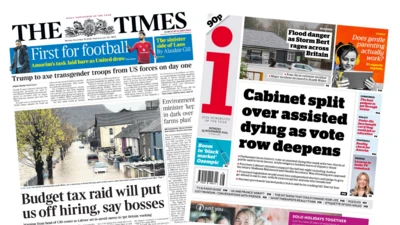We've updated our Privacy and Cookies Policy
We've made some important changes to our Privacy and Cookies Policy and we want you to know what this means for you and your data.
MPs protest over 'farcical' timetable for Welsh debate
Image source, HOC
- Author, David Cornock
- Role, ҙуПуҙ«ГҪ Wales Parliamentary correspondent
It doesn't take much, let's be honest, for Plaid Cymru to develop and nurture a sense of grievance here at Westminster. But on the paucity of time devoted to devolution during Tuesday's Brexit debate do they have a point?
Plaid MP Jonathan Edwards called it "farcical". On my watch, MPs spent 18 minutes debating the amendments made to the European Union (Withdrawal) Bill after complaints of a Westminster power grab.
Theresa May's deputy in all but name, David Lidington, said the UK government had made "very substantial compromises to address precisely the concerns raised by both Scotland and Wales."
So if they were that substantial why was there so little time to discuss them? The amendments were introduced in the Lords so MPs had not previously discussed them.
The reason why the debate was restricted to 18 minutes was largely a timetable set by the government in a programme motion approved by a House of Commons vote.
'Anorak'
Anorak detail klaxon: that motion split the issues and votes into two groups, with devolution in the second group. It said votes on the first group would begin three hours after proceedings begun and voting on the second group had to start 6 hours after proceedings begun. This meant that the votes on the first group ate into the time allocated for the second group. Commons votes take the best part of 20 minutes so there was little time left.
David Lidington told MPs: "I think that the government allowed perfectly adequate time for debate on these issues. As you know, these questions on devolution matters have been discussed in great detail by me, my ministers and officials, and the Welsh and Scottish governments and legislatures for many months.
"As I hope to explain, the Government have made very substantial compromises to address precisely the concerns raised by both Scotland and Wales. I am pleased that the Welsh Government have accepted the merits of the compromise we proposed and reached an agreement."
He also blamed Labour for eating into time by choosing to have 11 or 12 divisions. A cynic might suggest Labour didn't want to highlight its own divisions on the issue - the Welsh Government has done a deal, while Scottish Labour maintains the "power grab" narrative.
Mr Lidington's explanation predictably didn't wash with Jonathan Edwards, who complained: "The Welsh national interest has been completely ignored by a minority government in Westminster that has bulldozed this Bill through, with no time to vote on vital amendments to stop the disgraceful power grab.
"This farcical debate exposed just how little regard Westminster has for the concerns of Wales. The Bill will mark the first time since the inception of our national parliament that its responsibilities will be weakened by Westminster. It beggars belief that the Labour Party, who govern in Wales, did not see fit to vote at all on the government's amendment."
The amendments were approved by 321 votes to 40. Labour MPs, apart from Dennis Skinner, abstained.
UPDATE: SNP protests about the lack of time led to their Westminster leader Ian Blackford being evicted from the Commons during Prime Minister's Questions. He used a procedural device to try to get the Commons to sit in private. The Speaker refused to call an immediate vote, he remained standing and was ordered to leave. The other SNP MPs walked out in solidarity. #scenes as the young people say.
Top Stories
More to explore
Most read
Content is not available








